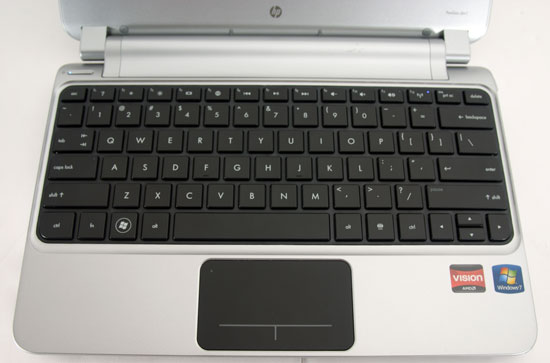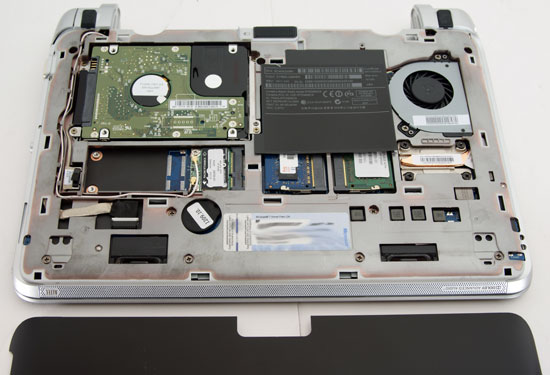HP dm1z: Taking Fusion on the Road
by Dustin Sklavos on February 21, 2011 7:00 PM ESTThe Swankiest Netbook You Ever Did See
First we should make one thing clear: the HP dm1z is basically small enough and slow enough to be considered a netbook, with most of the good and bad connotations that term brings with it. With that in mind, the dm1z is a remarkably attractive piece of kit and as you'll see, in many ways it feels like the netbook finally arriving at about the form factor and performance level it always needed to be at.
The lid of the dm1z is a textured black plastic that is a healthy stride away from the glossy plastic hell that used to plague HP's older models; it's attractive and doesn't easily pick up fingerprints and smudges, and the HP logo is nice and subdued in the lower corner. There's a silver trim that extends around the lid and into the body.
When you pop open the dm1z, you'll see that trim matched with silver matte plastics on the screen bezel and tastefully framing the keyboard and touchpad. HP has made some really great strides as of late in improving the looks of their notebooks, and the dm1z continues that trend. The silver plastic is used for the interior surface along with the battery and rim of the system and is complemented by sparse usage of white LED indicator lights.

HP has been pushing a standardized chiclet-style keyboard across all of their lines at this point, and it suits the dm1z. The 11.6" form factor allows HP to squeeze a comfortable full-sized keyboard into the unit, too, with the document navigation keys helpfully and logically mapped to Fn+arrow key combinations. The keys aren't marked that way, but it's easy enough to figure out. There's no number lock either, but I've never found the 10-key wrangled onto the main keyboard to be particularly useful. The only complaints about the keyboard are minor ones: HP, like Dell, opts to default the function keys to controls and shortcuts (though this can be toggled in the UEFI), and the left and right arrow keys are basically double-sized compared to the up and down arrows. On the whole, though, this is a solid netbook keyboard that most people should be very comfortable with.
The touchpad is more of a mixed bag, but kudos to HP for actually using a separate piece of plastic for it instead of just building the sensor into the inside panel. Of course, there's a reason for that: HP is using the same clickpad that's dogged their mainstream notebooks over the past year. To be fair the HP implementation is among the better ones used for Windows-based systems, it's multitouch capable, and the tracking surface is comfortable, but we would still rather see dedicated buttons on future refreshes. If you're using an external mouse or keep brushing the touchpad (not a problem I had in testing it), you can actually double-tap the top left corner of the touchpad with your finger to disable it; a pinpoint orange LED will glow when the touchpad is disabled.

One of my favorite features of the dm1z is actually on the bottom. HP has gone a long way towards simplifying user upgrades by simply putting one large, screwless panel on the bottom of the unit. The panel simply snaps on and off and feels both sturdy and user-friendly while also making the dm1z as a whole more attractive by hiding serial numbers and the Windows key. As you can see, everything you'd want to upgrade is easily accessible.
Taken as a whole I'll admit to being fairly smitten by the dm1z's design. It's remarkably well streamlined and clearly designed to improve the user experience while avoiding looking too chintzy or cheap. This is definitely one of the best-looking netbooks I've ever seen and it feels very solid.
















108 Comments
View All Comments
Impulses - Tuesday, February 22, 2011 - link
At the same time, this is cheaper than many tablets AND far more powerful and capable than just about any tablet... It may be anemic compared to a full fledged laptop, but you can get a lot more done on this than on a tablet. Frankly I think the market for this kinda system is larger than the market for tablets...IMO, the only people spending $500+ on a tablet are A) wealthy B) people who don't need an actual laptop for work/study C) people who have a big desktop replacement laptop and want something lighter to read, etc. It's just a total luxury item for someone that already has a smartphone and also needs a laptop.
Maybe I'm just blinded by my own usage habits, but I read a lot on my phone, and when I put it down it's because I want an actual keyboard (so I pick up my netbook), or I need an SD card slot or ample storage space, or I need to do stuff only my desktop can do (gaming, video editing/encoding, etc.). So a tablet's value to me would be pretty much limited to the couch, as a replacement for my phone when I'm watching TV, meh.
Powerlurker - Tuesday, February 22, 2011 - link
Most people, especially if they don't have school-age children, don't use their home computer to do "work". They do their work on an employer provided computer at their place of employment. They use their home computer for general web-browsing/media consumption, email/IM/Skype, and casual gaming.Shadowmaster625 - Tuesday, February 22, 2011 - link
Have you heard of Tiny 7? It is a stripped down windows 7 install that fits on one CD. It uses 145MB of RAM. There are many different groups all simultaneously discovering that win7 need not take up much more space or resources than win xp. The UI can be changed pretty easily also. For example, icons can be blown up really big on Windows 7. It is just a matter of getting x86 tablets out there in quantity for cheap. (ie under $200). Once there is a good base of tablets, there would be a whole bunch of hacking and optimizing going on. The only reason it is not happening is because tablet manufacturers are all hellbent on 200%+ markup. There just is no market for $600-$800 tablets, except for dumb yuppies who all bought ipads already.Dex1701 - Tuesday, February 22, 2011 - link
No offense, but a comment like that can only come from someone that values a sexy gee-whiz gadget over an actual portable computing device. Tablets are great fun and have their place, but if you actually want to get something done in an acceptable amount of time they don't work. Tablets = low-powered ultra-portable entertainment devices. They're great for some things, but if you want to be productive (even on a personal pursuit such as an artistic hobby) they're extremely limited even compared to a netbook.Does it really matter to you that much whether such a device is running MacOS, iOS, Linux, or Windows? Again, a comment like that can only come from someone that's more interested in image than results.
Griswold - Wednesday, February 23, 2011 - link
I think you're late to reality.Atom based netbooks were useless for most work tasks. Same with pretty much all tablets. They're recreational devices, you cant do any meaningful work with it.
This puppy seems to fill the gap just fine.
Sabresiberian - Sunday, February 27, 2011 - link
Tablets are a fad - and talk about anaemic! As soon as people realize how good they look in commercials but how so-so they actually are to use compared to a netbbook or laptop, they'll die out.I've said it before - give me a tablet with a hard cover to protect the screen and a decent amount of storage, say 300GB. Oh, wait, that's a laptop, never mind. Or, give me a tablet I can stick in my pocket. Oh, that's a smart phone. I guess I didn't want a tablet computer after all.
Something about the tablet reminds me of the Etch A Sketch, not sure what . . .
;)
helboy - Thursday, March 10, 2011 - link
well IMO tablets are for ladies and people who dont like to get their hands dirty ;) ...Gigantopithecus - Monday, February 21, 2011 - link
Tablets are great for consumption but those of us who produce need a real keyboard, real hard drive, and not to mention, better connectivity than what's offered with the iPad at least.I'm waiting for the X120e (love the nipp...err, trackpoint), but I expect its performance will be similar.
One question, Dustin - is the mini-PCIe slot mSATA enabled? I.e. does it support Intel's Soda Creek SSDs?
zepi - Monday, February 21, 2011 - link
I believe that vast majority of computer users are consumers. Most people don't actively generate new content, they merely consume it.Thus, for most of the people tablet could very well be The Ideal computer.
I vaguely remember seeing stats that only 10-20% users actively produce content and that the rest of us just read it. I couldn't find it now, but I suppose that Anandtech forums / comments could be used a quick statistics...
I wonder how much pure readers does Anandtech have in comparison to users who actually participate in creation of the content? Though I suppose Anandtech is not the site whose users portray the Average Joe that accurately.
For the entire history of computing, computers have been generated by Creators for Creators. Tablet, feature rich home consoles and internet-enabled televisions might just be a start of an era where most devices are based around consuming content, instead of generating it.
This applies to Jarred's post also. Anandtech Crew is definitely in the subset of creators, which I believe to be a tiny minority of all people.
freezervv - Monday, February 21, 2011 - link
And you don't see anything wrong with converting the majority of people into consumers, rather than creators?